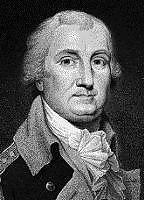Federalist National Ticket, 1804 |
 |  |
| Presidential Nominee | Vice Presidential Nominee |
Party Leader
Charles C. Pinckney SC | Former U.S. Sen.
Rufus King NY |
The Federalist Party in Jefferson’s First Term.
Federalists in Congress were shaken by the elections of 1800-1801. They slipped to a minority in both chambers: 17-15 in the Senate and 68-38 in the House. Although the party was dedicated to opposing Jefferson’s policies, in fact his proposals were so moderate that the Federalists had little to oppose. One of the most serious issues facing the Congress was the proposed 12th Amendment, which would separate the electoral voting between votes for President and those for Vice President. Federalists opposed the measure and blocked its passage in the Seventh Congress.
In the mid-term elections of 1802-1803, the Federalists did not fare well. They lost six seats in the Senate, leaving them with a 25-9 def
[More...]
Federalist National Ticket, 1804 |
 |  |
| Presidential Nominee | Vice Presidential Nominee |
Party Leader
Charles C. Pinckney SC | Former U.S. Sen.
Rufus King NY |
The Federalist Party in Jefferson’s First Term.
Federalists in Congress were shaken by the elections of 1800-1801. They slipped to a minority in both chambers: 17-15 in the Senate and 68-38 in the House. Although the party was dedicated to opposing Jefferson’s policies, in fact his proposals were so moderate that the Federalists had little to oppose. One of the most serious issues facing the Congress was the proposed 12th Amendment, which would separate the electoral voting between votes for President and those for Vice President. Federalists opposed the measure and blocked its passage in the Seventh Congress.
In the mid-term elections of 1802-1803, the Federalists did not fare well. They lost six seats in the Senate, leaving them with a 25-9 deficit. In the House, the party scored a net gain of one seat – but the new re-apportionment resulted in the DRs gaining 35 seats. The resulting party balance was 103-39. The Federalists had placed several key leaders on the ballot against DR incumbents with mixed results; for example, both John Quincy Adams and Timothy Pickering were narrowly defeated in Massachusetts by DR incumbents. The increased DR majorities in Congress made the Twelfth Amendment possible, and it was ratified in time to govern the election of 1804.
2d Federalist Caucus.
Federalist leaders gathered in Washington DC to celebrate Washington’s birthday on 2/22/1804. At the time, the Twelfth Amendment had not been adopted, and the Federalists hoped that they might be able to work with VP Burr to win either the presidency or the vice presidency in the election. The Caucus recommended Charles C. Pinckney and Rufus King, with no indication of which would be the candidate for president. After the passage of the Twelfth Amendment, party leaders informally decided to support Pinckney for President.
Popular vote of 1804
Electoral vote of 1804
1st Federalist Caucus (1800)
3d Federalist Caucus (1808)
Key sources
The Glorious Burden, pp. 69-77.
The Presidential Game, pp. 82-89.
[Less...]

